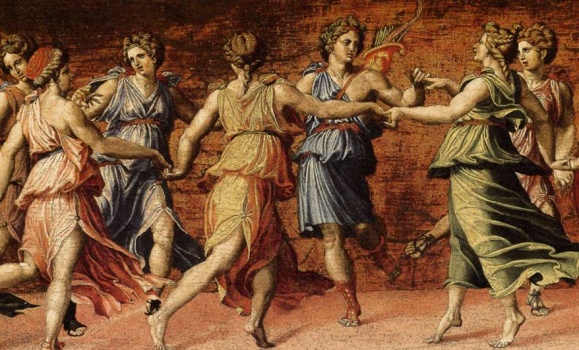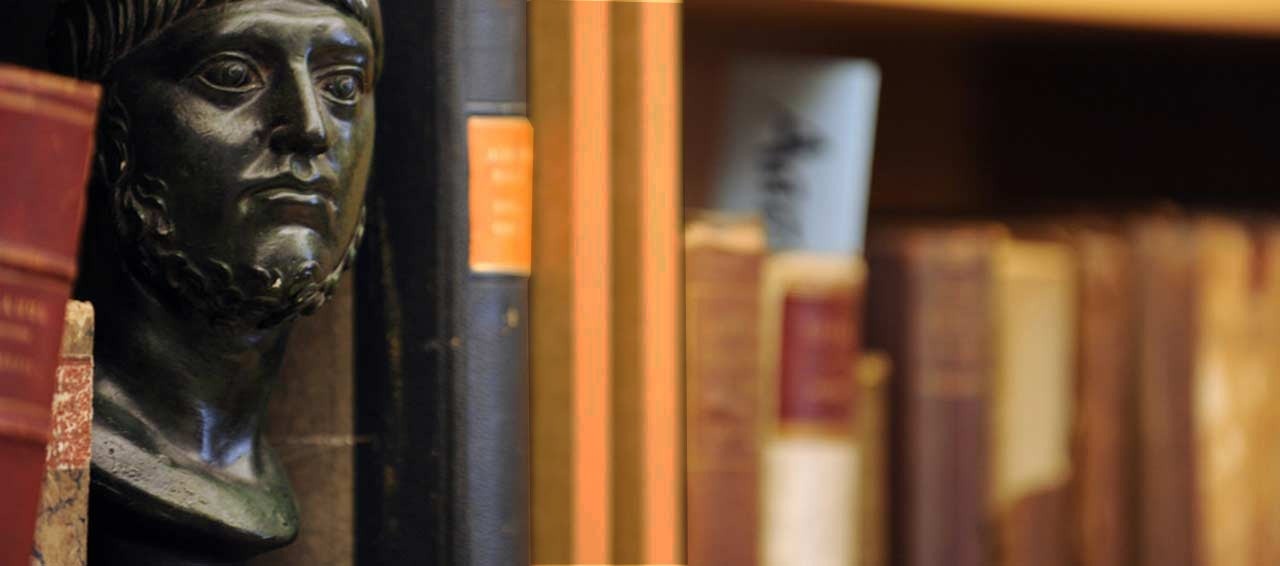News
» Go to news mainClassics News, Dionysius 34 December 2016 & the Muses on Friday March 10th

Dionysius 34
Dionysius 34 for 2016 is about to appear online or in your mailboxes. There are articles on polytheism, Socrates & Skepticism, Plato, Aristotle, Proclus, Dionysius the Areopagite, Albertus Magnus and Thomas Aquinas, considered in the light of multilingual international scholarship. There is a mix of senior scholars and those making promising starts which is characteristic of this Journal where many leading international figures in philosophy began

Stephen R.L. Clark is Emeritus Professor of Philosophy in the University of Liverpool. His “The Sphere with Many Faces” argues, as his predecessor in Classics at Liverpool, a founder of this Journal also did, for a pluralistic account of human psychology, politics and ethics, and also of cosmology, theology and ontology. John M. Dillon is Emeritus Fellow of Trinity College, Dublin, where he was the first Catholic to be Regius Professor of Greek. He has been a constant friend of Dionysius and the Department where he wasexternal examiner for Dr Seamus O’Neill’s dissertation. His generosity to our students is endless. His “Carneades the Socratic” explores the degree to which the New Academy saw their scepticism as constituting a return to the Socratic roots of Platonism. Wayne Hankey’s article is an expansion of his paper for the “International workshop Corpus dionysiacum areopagiticum” held at Oxford University in July 2016 with fifteen experts brought in, at least one from every continent—North America rated two. His “The Concord of Aristotle, Proclus, the Liber de Causis & Blessed Dionysius in Thomas Aquinas, Student of Albertus Magnus” asks how Aquinas could have defied “reason and the saints” embodied in the received Augustinian tradition and adopted an Aristotelian radicalism. The answer is found in Proclus mediated with quasi Apostolic authority and that of “The Philosopher”.
Guillaume Pilote has just received a joint PhD from Université d’Ottawa and Université Paris 1 Panthéon-Sorbonne, writing on Plato’s theory of recollection. He teaches Philosophy at CÉGEP de Sainte-Foy. His “Le mythe du Politique de Platon situé parmi les récits grecs de la genèse de la civilisation” compares texts of Plato, Dicaearchus, Lucretia, Diodorus and Tzetzes interpreting Hesiod’s myths on the Golden Age and Prometheus’s theft of fire. Alexander Edwards received his MA in Classics at the October Convocation for a thesis entitled “Aristotle’s Concept of Analogy and its Function in the Metaphysics”, supervised by Dr Diamond. His article on this subject engages, amongst much else, Matthew Wood’s article on analogy published in Dionysius 31. Antonio Luis Costa Vargas has submitted his dissertation, “Proclus and the Metaphysics of Time”, dealing with Proclus' conception of time and his reception of previous theories of time from Plato to Iamblichus, to the Humboldt University. His “Time, King of Heaven and Earth: Timeless and Timebound Metaphysics in Proclus” is drawn from this thesis. Augustine M. Reisenauer, O.P. is a PhD student in Patristics at the University of Notre Dame with a special focus on the theology of Augustine. He has taught at Providence College. His “The Love of Neighbor in Dionysius’s Hierarchies” shows that, despite an apparent disinterest in the love of neighbor, Dionysius transposes neighborly love into the language of superabundant and ungrudging beneficence and into the metaphysics of the superfluity and circularity of God’s deifying goodness and love.
Dionysius is enjoying unprecedented successes at present in terms of readership and financial sustainability. Availability online has increased the numbers reading it vastly and made precious scholarship once buried in our archives accessible and accessed! Moreover, the copyright regime which encourages this “open access” has put its cheque book where its mouth is with happy results for our bank balance. Donna Edwards manages to get done for no extra cost what once took a great part of our budget and Jacob Glover (BA, First Class Honours in Classics and Contemporary Studies, 2013; MA 2015) assisted by Tanisha Chakma (BA, First Class Honours, 2014, MA 2016) do fine and dedicated work for a fraction of our former costs. Dionysius is here to stay, become a subscriber. Visit https://www.dal.ca/faculty/arts/classics/journals/dionysius.html to subscribe.
Wisdom Belongs to God has a website
“Wisdom belongs to God” colloquium with “God Everyday and Everywhere (the 37th Atlantic Theological Conference) Sunday June 18th to Saturday, June 24th, 2017 to be held at and sponsored by the University of King’s College has established a website. On it you will find details of the Programme, the titles and abstracts of the colloquium papers, and materials to help participants of all kinds and levels to prepare for this week long festival. Inquiries to Justin Wollf at wollfjustin@gmail.com. All are invited to this week of philosophy, literary study and theology. See https://www.dal.ca/faculty/arts/classics/wisdom-belongs-to-god.html
Our prize winning students
Two of our undergraduates have won national awards for 2016 in the Canadian Association of Classics Essay Competition for Undergraduates. At the Junior Level Cristalle Watson was one of three winners with “‘A Pestilent Knave From Macedonia’: Narratives of Culture and Ethnicity in Demosthenes’ Third Philippic”. At the Senior Level Allison Graham was one of two winners with “Epicureanism and Cynicism in Lucian”. Earlier both Cristalle, in Latin, and Allison, in Greek, won national awards in the Sight-reading competitions, and last year Allison was crowned in the Junior Essay contest. Congratulations!
Faculty publications
Dr Alexander Treiger in Religious Studies has established a book series with Brill on Arab Christianity: “Arabic Christianity: Texts and Studies”. He will be the chief editor.
Dr Wayne Hankey, as well as his article appearing in Dionysius 34, has published “Pseudo-Denys and Later Platonic Traditions” in the Oxford Handbook of Catholic Theology, ed. Lewis Ayres and Medi Ann Volpe, Oxford University Press, online at: http://www.oxfordhandbooks.com/view/10.1093/oxfordhb/9780199566273.001.0001/oxfordhb-9780199566273-e-42. Print version awaits publication. In Press, he has: two book chapters: “Ratio, Preces, Intuitus: Prayer’s Mediation in Boethius’ Consolation”, for Praying and Contemplating: Religious and Philosophical Interactions in Late Antiquity & “God’s Indwelling: Aquinas’ Platonist Systematization of Aristotelian Participation” for Participation in the Divine, ed. Douglas Hedley and Evan King, Notre Dame University Press and a book, Aquinas’ Neoplatonism in the Summa Theologiae on God. A Short Introduction. South Bend, Indiana, St Augustine’s Press. Currently, he has five chapters or articles due at publishers by June 2018.
Enthusiastic new students & the Foundation year programme
The end of Term party was an enthusiastic gathering with lots of new students, many of them looking forward to entering Honours or MA programmes with us. A whole group of the most keen had been introduced to the Department through lectures in the Foundation Year Programme by our faculty and alumni. The present FYP Director is Dr Neil Robertson (MA 1987), Adjunct Professor in the Department. This term Dr Peter O’Brien, graduate of the FYP and the Department, lectured on the Iliad and the Aeneid; Dr Emily Varto (MA 2004) held forth on Thucyidides; both in Section I, co-ordinated by Dr Eli Diamond, graduate of FYP and the Department. Dr Roberta Barker (First Class Honours in Classics and English with the University Medals in Classics and English, 1996), also an alumna of FYP, co-ordinated Section III: Renaissance and Reformation. In it, the Revd Dr Gary Thorne (MA 1983), one of our Adjunct Professors, lectured on Luther, and Dr Kyle Frazer (BA First Class Honours, MA 1996), also an Adjunct, introduced students to the Neoplatonism of Pico della Mirandolla. In the Section on the Middle Ages, the Revd Dr Tom Curran (MA 1975), an Adjunct Professor of Classics, lectured on The Divine Comedy, as did Dr Robertson on Augustine’s Confessions. Dr Ian Stewart, another Adjunct Classics’ Professor, lectured on Anselm’s Proslogion & Galileo.
Dr Wayne Hankey will deliver the Concluding Lecture for the 2016-17 Foundation Year Programme, on Monday April 10 at 9:30 am in Alumni Hall at Kings. Entitled “We have come to a certain end of Western Civilization: Endings and Beginnings”, the lecture will be followed by a reception.
Pythian Games: the Muses on Friday March 10th
The Pythian Games will be played again this year at 5:00 pm on Friday, March 10th, in the Scotiabank Auditorium. The theme of this year’s Games is the Muses. Contributions to the list of performances are already coming in! The happy mixture of poetry, music, and performance for which the games are renowned will be under the direction of Dr Christopher Grundke, Acting Precentor.
Supporting Success
The ongoing strength and success of our Department suggests ways forward in this period when humanities and social science programmes are challenged. Ours is a continuing and confident intellectual tradition proud of belonging to and serving the place, people, and institutions from which it springs. High standards demanding dedicated teachers, and faculty above all dedicated to teaching, bring committed students. They find and help build a community which is theirs for life; their time as students becomes a memory of a paradise of mind, well watered by Dionysos. Constant innovation and outreach have made us the oldest and youngest Classics Department in Canada. In 1947 James Doull set Classics here on the course of understanding the contemporary world in its literary, religious, philosophical and historical origins, adding classes on Classical Civilization and philosophy to the curriculum. He invited back Robert Crouse, who arrived in 1963 to make Late Ancient and Medieval philosophy and theology part of that work. They, together with Hilary Armstrong, reached out to the international scholarly world with Dionysius in 1977, the year we granted our first PhD. In 1999, our students established Pseudo-Dionysius and took their own writing and research to the world. In 1981, Robert Crouse was a founder of the Atlantic Theological Conference, which will meet for the 37th time in June 2017, with eight of its 10 papers and responses being delivered by faculty or alumni of the Department. 2005 saw Arabic Studies gathered under one of our wings and in 2008 we took Religious Studies under another. In 1972 Classics helped re-found King’s College and the life of the King’s Chapel with the establishment of the Foundation Year Programme to which it remains a sine qua non. Since 2003 faculty and alumni of Classics and Religious Studies have been prominent in governing, teaching and fund-raising for “Halifax Humanities 101” to which they have recently added similar work in the Burnside Prison Education Program. Classicists will be found among those teaching in the very successful and promising Humanities for Young People (HYP) begun last summer at King’s College. In 2011 we started celebrating the literary, dramatic and musical skills of students and faculty in Pythian Games. New initiatives for our Liberal and Liberating Studies are constantly being generated, many of them, like many of these, conceived and fostered at King’s. Ours is a lively tradition constantly reinventing itself and worth supporting, please help it and our students. Donations for the work of the Department may be made at https://alumniapps2.dal.ca/giving/index?gift=classicsdept
Recent News
- CAC Sight‑Reading Winners!
- Recording of Seth Sanders' Lecture on Literary Creativity across the Mediterranean
- Inaugural Lecture by the Spatz Chair in Jewish Studies
- Upcoming Events to Welcome Two New Members of the Dalhousie Classics Faculty
- Classics grads sweep advanced national competition for Greek and Latin translation
- Spring Newsletter 2022
- Pythian Games 2022: Performances and Prizes
- The Odyssey of Star Wars: An Epic Poem
